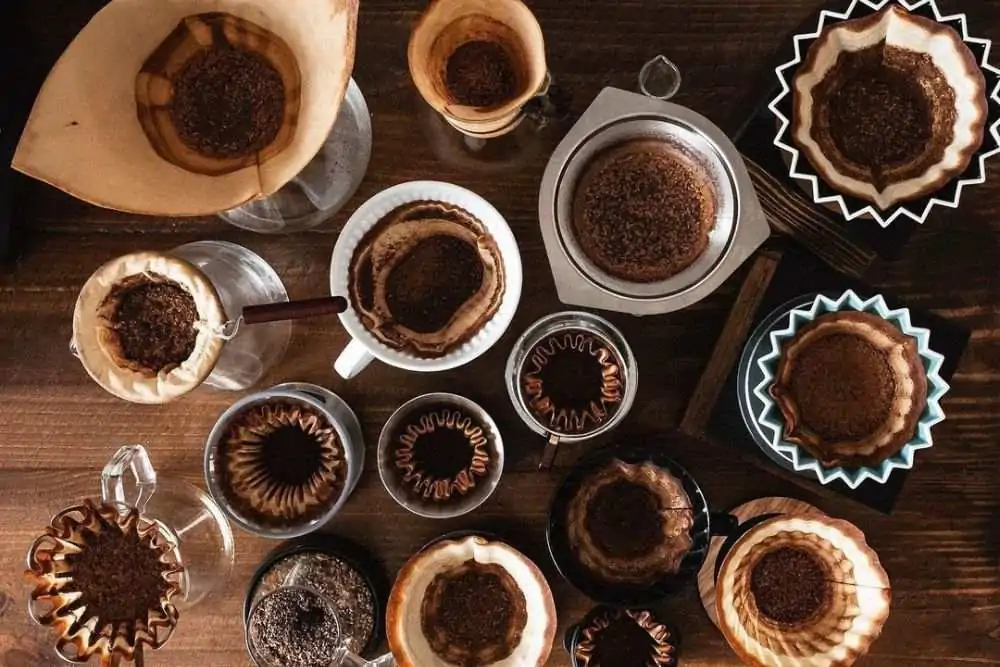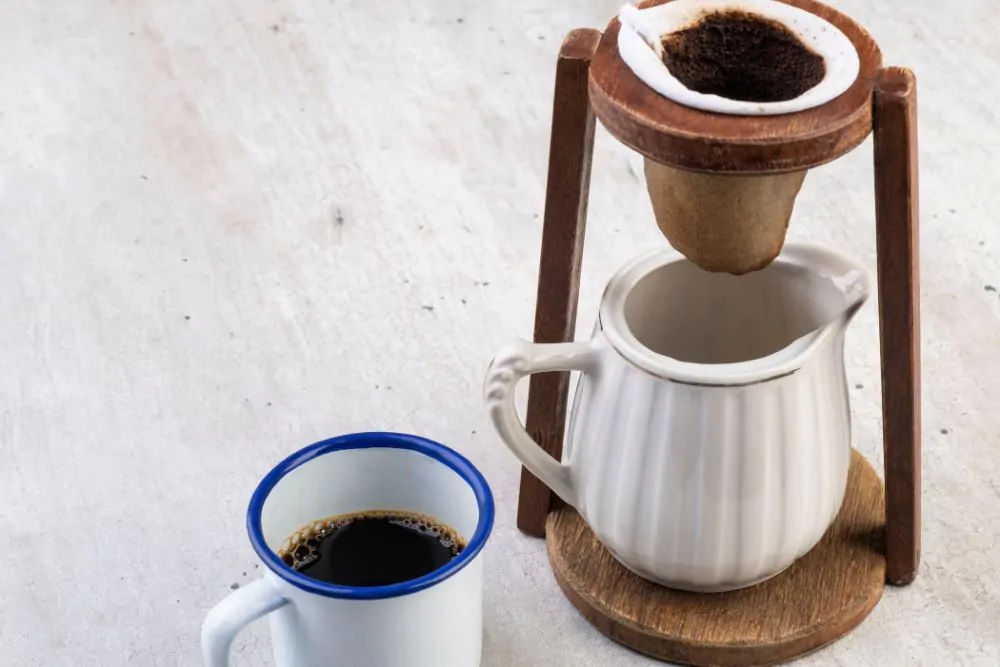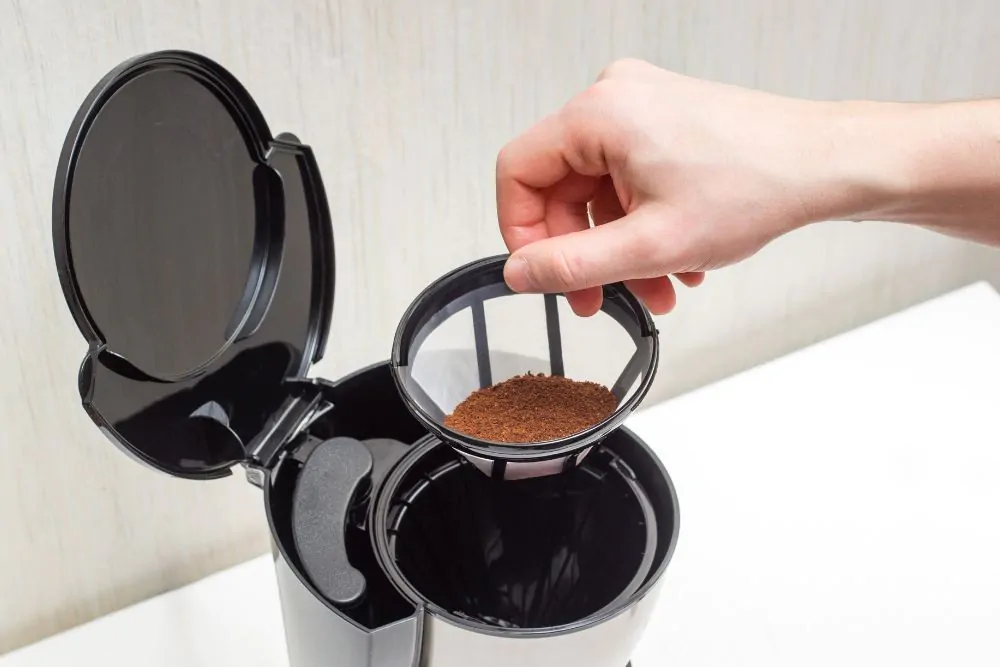If you love drip coffee, you may be overwhelmed seeing all the filters available. We’ll walk you through the types of coffee filters so you can pick the best one.

Coffee filters play an important role in making coffee – they keep the coffee grounds out of your cup of Joe. They also influence the taste by trapping some of the coffee oils. Many kinds of coffee filters can even capture diterpenes, compounds that can raise cholesterol levels – but if you’re generally healthy and drink reasonable amounts of coffee, you don’t need to worry about coffee meddling with your cholesterol.
Nowadays, there are different types of filters available, and you may be unsure which is right for you. There’s no single answer when determining what kind of best; it depends on many things, including what kind of coffee you like and the brewer you own. Let’s explore the options.
1. Paper Filters
Paper filters are tightly woven and very absorbent, so they let no coffee oils or particles through. As a result, what you get is a very clean and bright cup of coffee. If you hate even the tiniest bit of sediment in your cup, then paper filters might be your best option.
When it comes to convenience, it’s hard to beat these filters. Since they’re single-use, all you have to do after making coffee is throw them in the trash can. However, this doesn’t make them very environmentally friendly.
Paper filters come in different shapes and sizes, so you need to make sure the ones you buy are suitable for your brewer. However, the majority of coffee makers use either cone or basket filters.
Cone paper filters, as the name suggests, are shaped like party hats. These filters are mainly used for pour-over coffee makers, as well as drip machines with smaller capacities. They come in four sizes, and you need to find the one that matches your brewer.
Large drip coffee makers, on the other hand, use basket paper filters. These filters look like muffin liners and typically come in one size.
But as if that’s not enough, many brands also produce paper filters specially designed to work with their coffee brewers; Chemex, AeroPress, and Hario V60 are just a few. Regular cone and basket filters are readily available in most supermarkets, but branded paper filters are slightly more difficult to come by.
Aside from the shape, you can also choose whether to use bleached or unbleached paper filters. Between the two, an unbleached filter is more eco-friendly, as it’s not treated with chemicals that are bad for the environment. Since it’s not processed, an unbleached filter imparts a papery taste to your cup of java; this is fixable by rinsing the filter before use.
2. Metal Filters
In terms of popularity, metal filters come pretty close to their paper counterparts. The main reason for that is probably the fact that they’re reusable. If taken proper care of, a metal filter could last you a lifetime.
So even though metal filters do cost more upfront, chances are, you’ll never have to repurchase one again. Since they’re not single-use filters, they’re also a greener option.
Metal filters are loved by coffee drinkers who prefer a richer, full-bodied cup of java. The mesh has larger pores compared to paper, so it lets some particles and coffee oils into your cup.
Certain coffee flavors are only present in oils, so the coffee you make with a metal filter can be quite different from one made with paper.
When it comes to maintenance, metal filters require daily upkeep. For the most part, a quick rinse with hot water will do the trick, but in the case of stubborn debris, it will require scrubbing. Certain metal filters are also dishwasher-safe, which saves you the hassle of cleaning it yourself.
Coffee makers like Moka pots, French presses, and espresso machines use built-in metal filters. But many brewers that use paper filters also offer compatible metal alternatives, like pour-over and AeroPress.
3. Cloth Filters

Cloth filters are nowhere near as popular as their paper and metal counterparts. This is quite a shame, given they’re somewhat of a middle ground between the two.
Like a paper filter, a cloth filter ensures no coffee particles get in your cup. But at the same time, it does let some of the oils through, just like a metal filter. So what you get is a rich, full-bodied brew without any sediment.
When it comes to its lifetime, a cloth filter also falls somewhere in the middle. It’s reusable about 100 times, after which it starts giving your coffee off flavors from the trapped oils and particles of past brews.
Among all types of filters, cloth filters require the most maintenance. Not only do you need to wash them after each brew, but you also boil them every now and then to sanitize them and get rid of absorbed oil.
The use of cloth filters is limited to pour-over brewers. They also come in different sizes, so you need to find one suitable for your coffee maker.
4. Bamboo Filters
Bamboo filters are usually made with a combination of bamboo material and paper pulp. Regular trees take decades to mature, but bamboo is the fastest-growing plant in the world. Some kinds can even grow almost a meter a day.
Even though bamboo filters are single-use, they’re eco-friendly as they’re biodegradable and because bamboo is easy to replenish. Once you’re done with them, you can throw bamboo filters in your compost bin.
Compared to paper counterparts, bamboo filters are more porous, so they allow coffee to drip through faster. They also let a bit of coffee oil through, not as much as metal filters, but enough to get a full-bodied cup of joe.
Bamboo filters aren’t as widely available as paper or metal. What’s more, they’re mainly made in a cone shape, which makes them suitable for pour-over drippers but little else. Learn more in our bamboo coffee filters vs. paper coffee filters guide.
5. Charcoal Filters
Unlike other filters on this list, charcoal filters don’t actually filter your coffee. But what they do is filter the water. Given that more than 98% of a cup of coffee is water, water quality is important.
Charcoal filters are made of activated charcoal, which means it was heated to become more porous. What this does is it allows adsorption – the capability to attract particles to its surface. So basically, the charcoal filter attracts pollutants to itself, cleaning the water along the way.
There’s only so much one filter can remove. After it reaches its limit, you need to replace the filter with another one. This is generally done after a month or so, depending on how often the coffee maker is used.
Finally, it’s worth noting that only specific machines use charcoal filters – mostly drip coffee makers. For other types of machines, you’ll need to filter the water before it reaches the machine.
6. Plastic Filters

Last but not least, we have plastic filters. These filters typically consist of a plastic basket that’s covered with metal mesh.
Typically, they’re made of BPA-free nylon, which is a thermoplastic resin with the highest melting point. This makes it perfectly safe for use with hot liquid. What’s more, the plastic retains heat better than any other filter, so it won’t meddle with your brew.
While they don’t last as long as metal filters, plastic filters are designed to be used over and over again. And like metal filters, they also let sediment and coffee oils through, so you get a rich cup of coffee.
Most plastic filters are dishwasher-safe, which makes maintenance simple. Bear in mind that cheaper plastic filters can leave a funky taste in your coffee. If you liked this post, you might also be interested in our round-up of clever ways to use coffee filters around the house.
